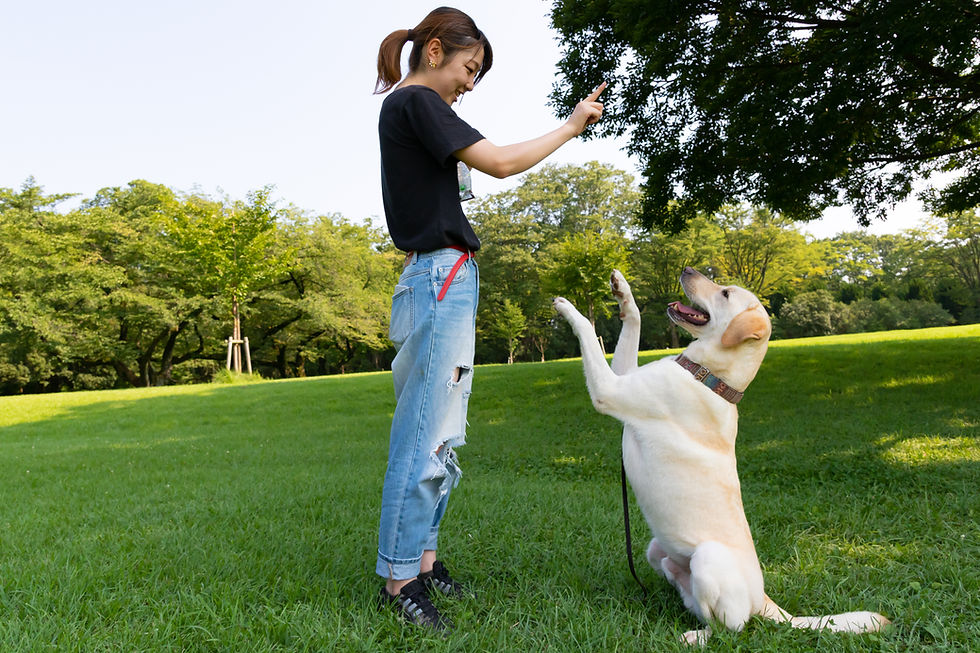At what age are dogs most disobedient?
- Subhodip Unitel
- Sep 24, 2024
- 3 min read
Understanding the developmental stages of dogs can help you manage their behaviour effectively. While every dog is unique, certain ages are commonly associated with increased disobedience. This blog will explore these key periods and offer insights into how to address behavioural challenges.

The Early Months: Puppyhood
Puppyhood is a crucial time for establishing good behaviour patterns. Typically, this stage lasts from 8 weeks to about 6 months. During this period, puppies are eager to explore their environment. However, they may also display disobedient behaviours, such as chewing, barking, or ignoring commands.
Importance of Socialisation for Dogs
Socialisation is vital during the early months. Exposing puppies to different environments, people, and other animals helps them develop confidence and reduce anxiety. A Certified dog trainer can guide you in effective socialisation techniques. This step is crucial to preventing disobedience later on.
Training Basics
During this stage, basic commands like “sit,” “stay,” and “come” should be introduced. Consistent training is essential. Short, engaging sessions help keep puppies interested. Incorporating positive reinforcement encourages them to respond positively to commands.
The Adolescent Stage: 6 Months to 2 Years
The adolescent phase, from around 6 months to 2 years, is often when dogs are most disobedient. They begin to test boundaries and assert independence. This behaviour can manifest as ignoring commands or being easily distracted.
Common Challenges
During this stage, dogs may engage in unwanted behaviours like jumping, barking, or digging. These behaviours often stem from their desire for attention or play. It's essential to remain patient and consistent during this time.
Advanced Dog Training
To address these challenges, consider advanced dog training techniques. These methods can help redirect your dog’s energy and focus. Engaging with a Dog Obedience Trainer can provide the skills and tools necessary for effective training during this challenging phase.
The Importance of Consistency
Consistency is crucial in managing disobedience at any age. Establishing clear rules and routines helps your dog understand what is expected of them. Use the same commands and rewards consistently to reinforce learning.
Maintaining Engagement
Keep training sessions exciting. Incorporate games or interactive activities to hold your dog's attention. Changing your training environment can also stimulate their curiosity and prevent boredom.
The Role of Environment
A dog’s environment can significantly influence its behaviour. Ensure your dog has a safe, stimulating space to explore. Regular exercise is vital for their physical and mental well-being. Dogs that are adequately exercised are generally less likely to exhibit disobedient behaviours.
The Role of Professional Help
If you find it difficult to manage your dog’s disobedience, professional help can make a significant difference. Engaging with a Dog Trainer can provide tailored advice and techniques specific to your dog’s needs. Professionals can also help with canine training programs that focus on improving obedience and behaviour.
When to Seek Help
If your dog shows signs of aggression or severe disobedience, seek help immediately. A Certified dog trainer can assess the situation and develop a plan to address these issues effectively.
Transitioning into Adulthood: 2 Years and Beyond
As dogs mature, their behaviour often stabilises. By the age of 2, many dogs begin to settle down. However, some breeds may remain playful and energetic well into their adult years. During this time, it's important to continue reinforcing good behaviours.
Lifelong Learning
Training doesn’t stop once a dog reaches adulthood. Continuous training, including refresher courses, helps maintain their skills. Engaging in new activities, such as agility or obedience classes, keeps your dog mentally stimulated.
The Benefits of Ongoing Training
Ongoing training enhances the bond between you and your dog. It also helps prevent the resurgence of disobedient behaviours. Regularly engaging with a Dog Obedience Trainer ensures that you are equipped to handle any challenges as they arise.
Conclusion
Understanding that dogs are most disobedient during specific ages, particularly in puppyhood and adolescence, can help you manage their behaviour more effectively. Training, socialisation, and consistency are key to fostering good habits. For professional guidance, consider seeking a Dog Obedience Trainer. At Pawsative Choices, we offer tailored training solutions that promote lasting positive behaviours in your dog. Engaging with our experienced trainers can set your furry friend on the path to becoming a well-mannered companion.



Comments